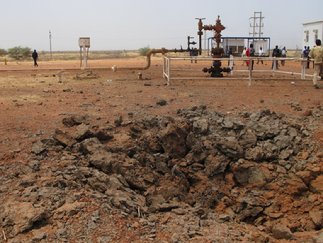Cheap Oil Is Devastating South Sudan
The most oil-dependent country is also getting the lowest price
Falling oil prices is bad news for a lot of countries that depend on black gold to keep their economies afloat. But the country that’s being squeezed the most is also the world’s most fragile state.
It’s a catastrophic combination for South Sudan, which is one of the most oil-dependent countries in the world. According to the human rights group Fund for Peace, South Sudan’s civil war has also contributed to it becoming the most unstable and fragile country in the world—worse than Somalia.
The war reached its one-year anniversary on Dec. 15. The situation has worsened since, with ceasefire talks parlayed by the East African trade bloc Intergovernmental Authority on Development collapsing on Dec. 22.
The central conflict in South Sudan is a war between the current Pres. Salva Kiir and the former deputy president, Riek Machar. In December 2013, Kiir accused Machar of fomenting a coup—an accusation that quickly pitted the Machar-led White Army against the Sudan People’s Liberation Army, which is loyal to Kiir.
There’s also an ethnic dimension to the conflict, as the White Army is heavily comprised of ethnic Nuer, with Dinka fighting on the side of the president. Murder, rape and pillage are common tactics on both sides.
There are several reasons why South Sudan could get worse in 2015. The country’s economic prospects are largely tied to global oil prices. That seemed like a blessing when South Sudan declared its independence on July 9, 2011.
Today, it looks more like a curse. The price plunged to $55 in December 2014. It could very well stay low for months, or even longer than that. The war has also damaged the country’s oil facilities. Were fighting to cease—a highly uncertain prospect—and oil prices to again rise, there’s no guarantee South Sudan could quickly bring oil production back to pre-2011 levels.
Worse, South Sudan gets much less than $55 per barrel of oil. The real number is closer to $25 per barrel. This is because the country’s crude isn’t directly tied to global prices. Instead, the government pays a fixed price to Sudan, which exports the oil through pipelines than run from South Sudan to northern Sudanese ports.
According to the Financial Times, South Sudan pays $26 for every barrel of oil exported to Sudan, with $15 per barrel acting as compensation for Sudan losing the oil fields after independence. Another $11 pays for pipeline transfer fees.

At top—rebel soldiers in South Sudan on Feb. 26, 2014. Ilya Gridneff/AP photo. Above—a bomb crater next to a South Sudanese oil well on March 3, 2012. Amanda Hsiao/Enough Project photo
This made sense when oil was expensive. But oil is always a risky investment, and future prices subject to a great deal of speculation and uncertainty, no matter the current price.
Now oil is cheap—and South Sudan gets barely anything. Not only is it one of the most oil-dependent countries, South Sudan also gets less money per barrel than any other country in the world.
But the main problem is that both the Uganda-backed SPLA and the White Army’s leaders don’t feel they have anything to gain by giving up. That’s after 50,000 people died and hundreds of thousands fled their homes.
“Despite a ceasefire that was violated almost immediately upon its inception, it appears that neither side at this junction perceives that it is ‘losing’ and could be compelled to put down arms,” the Fund for Peace stated in its June report.
This is still very true.
“While the espoused ideals of national unity and statehood still find their way into press conferences and meetings convened by regional leaders,” the report adds. “These appear to be little more than lip service meant to placate at best and buy more time for territorial and other war gains at worst.”
That’s actually an improvement, owing higher food stocks after the annual October-to-December harvest. But the number of hungry people is expected to rise again to 2.5 million between January and March. The end of the harvests also coincides with the end of the rainy season, during which fighting slows down because of the mud.
The coming months should also see the introduction of Chinese troops into the conflict. The first soldiers in a 700-strong Chinese battalion are set to arrive in the country in January, with the rest of the battalion landing in March. They’ll join the 11,151-strong U.N. force in the country.
Sixteen U.N. soldiers and police have died in the conflict. Three Russians died in August when rebels shot down an Mi-8 helicopter near the town of Bentiu.
The latter half of 2014 also saw the introduction of private military companies involved in the oil fields—which are largely under the SPLA’s control. Frontier Services Group, a merc firm headed by former Blackwater executive Eric Prince, is flying helicopter resupply missions to oil fields in the country’s north.
If only the oil were worth more than $25 per barrel.
- Database Search
- Unpaid Debt A comprehensive overview of the role of the Lundin Consortium in the oil war. ECOS calls upon the Swedish, Austrian and Malaysian governments to investigate whether, as a matter of international law, Lundin, OMV and Petronas 'were complicit in the commission of war crimes and crimes against humanity by others during the period 1997-2003.’ In response, the Swedish Public Prosecutor for International crimes opened a criminal investigation into ‘links between Sweden and the reported crimes’.
- In Depth For more specific information about the Lundin court case please visit the Unpaid Debt dossier.



